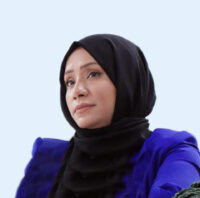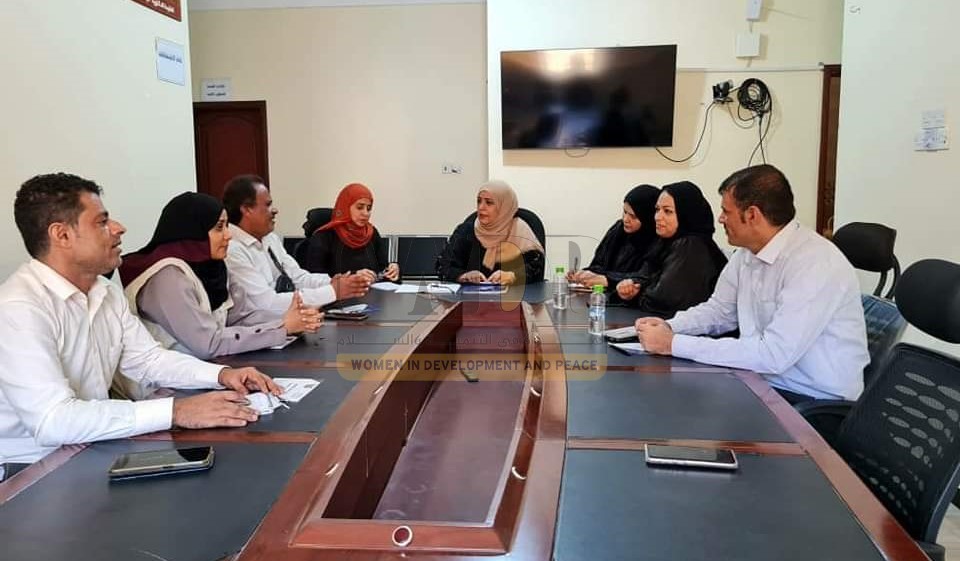
Nahid Omar Salim
General Director of E-Learning at the Ministry of Education – Aden
Educational Institution Management System Consultant “ISO 21001”
(Women in Government Roles Consultant)
.
Women play an important role in social and economic development worldwide, and their participation in the labor market is a vital factor in achieving sustainable development and social justice. In Yemen, women make up a significant percentage of the population, yet their involvement in the workforce – especially in the civil service – remains low; they face substantial obstacles that hinder their effective contribution to this sector.
The number of working women in the civil service rose from 18% in 2010 to 22% in 2020, with their employment concentrated in the education, health, and social welfare sectors. There’s a geographic disparity in the distribution of working women, with higher percentages in major cities compared to rural areas.
Women’s participation in the civil service is essential for achieving sustainable development at all levels, by providing equal opportunities for women to engage in government work, empowering them to build more just and prosperous communities, and securing a better future for upcoming generations.
The Importance of Women’s Participation in the Governmental Sector
Empowering women and enhancing their participation in the workforce is a foundational pillar for achieving sustainable development, social cohesion, and peacebuilding in Yemen. Yemeni women possess enormous potential and capabilities that can significantly contribute to building a prosperous society and a secure, stable country. The benefits of empowering women include driving economic development through increased productivity and economic growth, creating new job opportunities, improving living standards, enhancing social cohesion and justice, cultivating a more inclusive and open environment, and actively engaging in conflict resolution and peacebuilding through participation in negotiation processes, peacekeeping, and transitional justice.
The significance of women’s participation in the civil service is paramount for numerous reasons; it is a critical step toward achieving sustainable development across various dimensions. Some of these reasons include:
- Promoting gender equality, which is a key goal of sustainable development; women’s participation in the civil service helps reinforce the principle of gender equality and equal opportunities, ensuring fair representation of women at various decision-making levels.
- Leveraging women’s skills and competencies can greatly enhance government operations and improve the quality of services offered to citizens.
- Stimulating economic growth; women’s participation in the labor market increases the overall workforce, boosting economic growth and contributing to comprehensive development. Women are crucial to developing human capital, and investing in their capabilities supports long-term sustainable development.
- Diversifying opinions and perspectives; having women in decision-making positions adds diversity to viewpoints and judgments, leading to more inclusive and equitable decisions. Women’s involvement in the civil service encourages a variety of ideas and experiences, improving the quality of government services available to citizens.
- Developing public policies; they bring forth unique issues and concerns that can lead to the creation of governmental policies and programs that address the needs of all segments of society.
- Serving as a role model for future generations encourages more women to pursue their professional ambitions.
However, a report from the United Nations Development Program (UNDP) shows that women’s voices in Yemen are still significantly marginalized; they hold just 4.1% of administrative and decision-making positions in the country, which is a barrier to achieving sustainable development in Yemen. Women possess a unique understanding of both family and community life, making them an invaluable asset in leading the change that society urgently needs.
The Challenges that Women face
Despite the importance and benefits that society and state institutions would gain from women’s participation in government work in Yemen and holding influential leadership positions, women still face significant challenges that affect their effective contributions in this sector. Some of these challenges include:
- Gender discrimination: Women in Yemen suffer from clear gender discrimination in hiring and promotions, as men are often preferred over women for many jobs and leadership roles.
- Societal perceptions: Negative societal views still hinder women’s participation in government work; some people believe that a woman’s place is in the home and not in the workplace, which affects women’s self-confidence and desire to advance in their careers.
- Security and social challenges: Women in Yemen face security and social challenges that make it difficult for them to work in certain areas and positions, limiting their mobility, especially since government work in Yemen often operates with outdated tools and procedures.
- Institutional challenges: There’s a lack of female representation in supervisory leadership positions, partly because much of the institutional work has shifted to male-dominated evening gatherings (Deewan Al-Qat) in Yemen, which has in turn limited women’s empowerment and confidence.
- Lack of guidance and professional support: Many women lack mentorship and professional support programs, as well as knowledge about job qualifications, which hinders their professional development and promotion opportunities.
- Infrastructure and supportive environment: The lack of infrastructure and services like childcare facilities and supportive policies for working mothers makes it difficult for women to balance work and family life.
Additionally, Yemeni women struggle with a lack of technical skills and experience; they often lack the necessary skills and expertise to succeed in the business environment, particularly in technical and advanced fields, due to limited educational and training opportunities available to them, along with insufficient support. They do not receive adequate backing from the community, government, or NGOs, whether financially, technically, or morally.
While most NGOs allocate their budgets and plans toward relief activities, they neglect to support women’s economic empowerment across various fields and government sectors. Beyond these challenges, women in Yemen face additional obstacles like the impact of ongoing conflicts, security breakdowns, poverty, displacement, and other issues that severely hinder their participation in or development of government work.
Recommendations and Solutions
To tackle these challenges and boost women’s participation in government work in Yemen, the following recommendations should be considered:
- Strengthen supportive policies for equality by implementing and activating clear policies aimed at promoting gender equality at all stages of hiring and promotion.
- Bridge the wage gap by taking concrete steps to ensure equal pay between men and women in the same positions.
- Encourage women to take on leadership roles by providing training and mentoring programs specifically for women to prepare and empower them for leadership positions.
- Improve infrastructure by developing supporting services, such as flexible work policies and childcare facilities, to support working women.
- Enhance security and stability and work on improving the security, social, and economic conditions in Yemen to provide a safe environment for women working in the government sector.
- Support and promote women’s participation in decision-making and government policy-making.
Supporting women’s participation in government work in Yemen is a crucial step towards sustainable development and social progress; this will achieve gender balance in government, leadership, and supervisory representation. Women around the world—especially in Yemen—have proven their ability to drive change and achieve justice and equality, effectively contributing to the economic, social, and security advancement of their communities.

